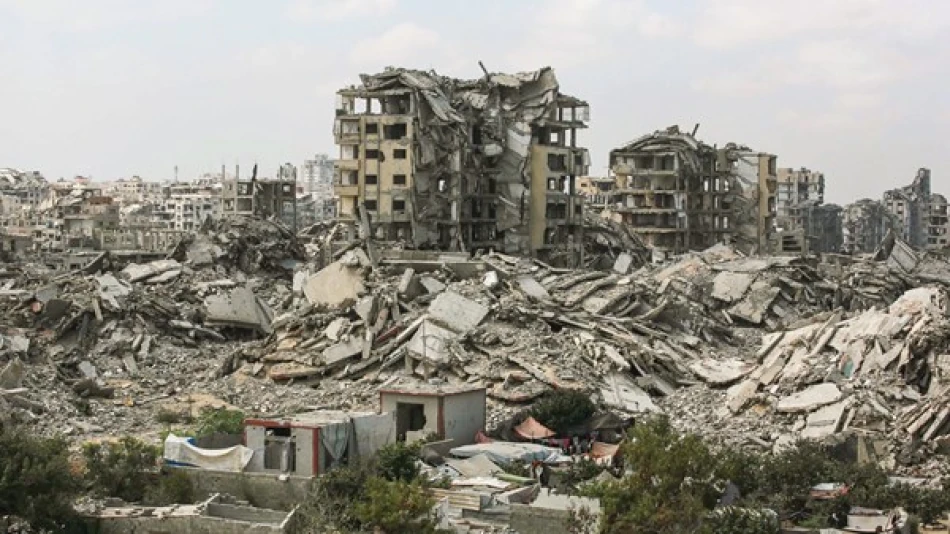
UAE Condemns Israel's Occupation of Gaza, Violating International Resolutions
Arab-Islamic Coalition Condemns Israel's Plan for Full Military Control of Gaza
A 23-nation Arab-Islamic ministerial committee has issued a sharp condemnation of Israel's declared intention to establish complete military control over Gaza, calling it a dangerous escalation that violates international law and undermines global peace efforts. The coalition's response signals growing regional unity against what they characterize as an attempt to legitimize permanent occupation through force.
Unified Regional Opposition Emerges
The ministerial committee, established by an extraordinary Arab-Islamic summit, represents a broad coalition spanning from Gulf states like the UAE, Saudi Arabia, and Qatar to African nations including Nigeria, Chad, and Somalia. This diverse group unanimously rejected Israel's military control plans, describing them as a continuation of what they termed "grave violations based on killing, starvation, and forced displacement attempts."
The UAE, speaking for the coalition, emphasized that Israel's approach contradicts international legitimacy resolutions and represents an unacceptable attempt to impose facts on the ground through military force. This coordinated response demonstrates how the Gaza conflict has galvanized regional powers across traditional divides.
Escalation After 22 Months of Conflict
The committee's statement comes after nearly two years of comprehensive aggression and blockade affecting all aspects of life in Gaza, according to their assessment. They characterized Israel's declared intentions as part of a broader pattern that includes settler violence and annexation attempts in Palestinian territories.
The coalition warned that Israel's approach eliminates any opportunity for peace achievement and undermines regional and international de-escalation efforts. This timing is particularly significant as it coincides with ongoing mediation efforts by Egypt, Qatar, and the United States to broker prisoner and hostage exchanges.
Humanitarian Crisis and International Accountability
The ministerial committee demanded immediate and comprehensive cessation of what they termed Israeli aggression on Gaza, calling for unconditional access for humanitarian aid including food, medicine, and fuel. They specifically emphasized the need to ensure freedom of operation for relief agencies and international humanitarian organizations.
The coalition held Israel fully responsible for what they described as genocide crimes and an unprecedented humanitarian catastrophe in Gaza. They called on the international community, particularly permanent UN Security Council members, to fulfill their legal and humanitarian responsibilities through urgent action.
Economic and Reconstruction Implications
Beyond immediate humanitarian concerns, the committee announced plans to begin implementing an Arab-Islamic reconstruction plan for Gaza and called for active participation in an upcoming Gaza reconstruction conference scheduled in Cairo. This economic dimension suggests regional powers are preparing for post-conflict scenarios while simultaneously condemning current military actions.
The reconstruction initiative represents a significant financial commitment from oil-rich Gulf states and demonstrates their willingness to invest in Palestinian territories' future, potentially creating alternative power structures to Israeli control.
Two-State Solution Reaffirmed
The coalition strongly reaffirmed their commitment to the two-state solution, insisting that just and lasting peace can only be achieved through establishing an independent Palestinian state based on June 4, 1967 borders with East Jerusalem as its capital. They specifically recognized Jordan's Hashemite custodianship over Islamic and Christian holy sites in Jerusalem.
This position directly challenges Israel's apparent long-term control plans and maintains international legal frameworks that have governed Middle East peace processes for decades. The explicit rejection of any attempts to displace Palestinians from Gaza, the West Bank, or East Jerusalem represents a red line for regional powers.
Regional Stability at Stake
The coordinated response from this broad coalition suggests that Israel's Gaza control plans risk destabilizing relationships with key regional partners. Countries like the UAE and Saudi Arabia, which have pursued normalization policies with Israel in recent years, are now taking strong public positions against Israeli military objectives.
This development could complicate future diplomatic initiatives and economic partnerships, particularly as Gulf states balance their strategic relationships with both Israel and the broader Arab world. The unified statement indicates that Palestinian issues remain a significant factor in regional diplomatic calculations despite previous normalization trends.
Most Viewed News

 Layla Al Mansoori
Layla Al Mansoori






